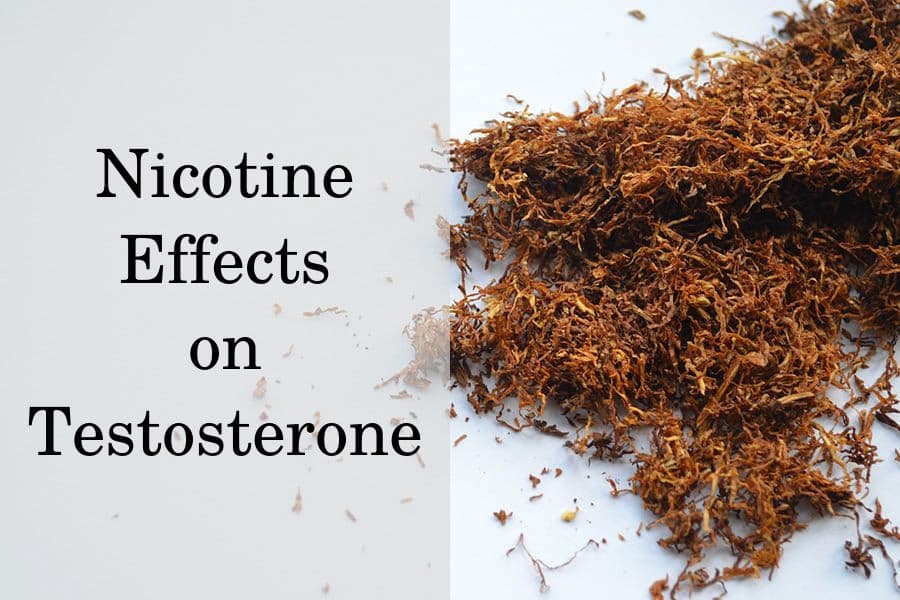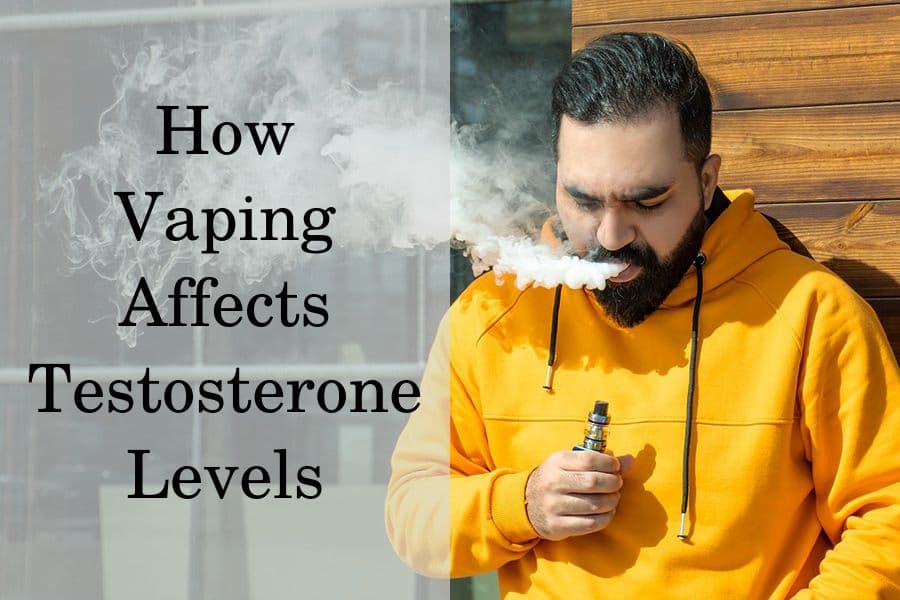Smoking introduces over 7,000 chemicals into the body, of which hundreds are toxic, and about 70 can cause cancer.
As a result, this unhealthy habit has been reported to:
- strain the heart
- reduce oxygen delivery to the tissues
- increase the risk of lung disease
Interestingly, smoking has also been associated with higher testosterone (T) levels in men despite wreaking havoc on the body in every other health-related aspect.
Moreover, different forms of smoking have been suggested to have different potential effects on testosterone levels and overall fertility in men.
In this article, we will break down the latest data on how smoking may affect testosterone, including the potential effects of cigarettes, cigars, nicotine gums, tobacco chewing, and even marijuana smoking.
How nicotine affects testosterone
Nicotine is a naturally occurring alkaloid found in tobacco leaves that binds to the nicotinic acetylcholine receptors in the brain, leading to the release of neurotransmitters like dopamine.
This release is associated with feelings of pleasure and alertness, which contributes to nicotine’s stimulant-like effects.
Yet, the alkaloid can also be addictive, and its stimulating effects can increase heart rate and blood pressure, putting a strain on the cardiovascular system.
Despite the potential harm of chronic nicotine use, studies suggest that the alkaloid may have some benefits for testosterone levels in men.
For example, several preliminary studies performed in animals or in vitro suggest that nicotine may help reduce the activity of an enzyme called aromatase.
Aromatase is associated with decreasing testosterone levels and converting into estrogens. By blocking the activity of aromatase, nicotine may help reduce this conversion and promote higher T levels.
Another in vitro study suggests that this may also be a specific effect of one of nicotine’s metabolites, called cotinine, as well as for other nicotine-like alkaloids such as anabasine.
A 2016 meta-analysis of 22 studies, encompassing over 13,000 men, reported that smoking nicotine-containing products appears to be associated with having 44 ng/dl higher testosterone levels compared to non-smokers.
An increase of 44 ng/dL is approximately 5-10% of the total T levels in healthy men (300-1000 ng/dL)
While the difference is rather small and unlikely to have any noticeable effect on a man’s health, the researchers report that the finding is consistent.
They suggest that nicotine byproducts might have another effect: slowing down how testosterone is broken down. This is linked to nicotine’s impact on certain liver enzymes.
These enzymes are crucial for deactivating testosterone and other similar fat-soluble molecules. In detail, nicotine might prevent liver enzymes from adding glucuronic acid (glucuronidation) to testosterone, which helps the body excrete.
As a result of blocking glucuronidation, testosterone might stay active in the body for longer.
This could also mean that medicines containing testosterone, like testosterone replacement therapy (TRT), might last longer in the body. Thus, nicotine may potentially increase or prolong the effectiveness of TRT as well.
Does smoking increase or decrease testosterone?
As mentioned, a meta-analysis suggests smoking cigarettes appears to be associated with higher testosterone levels in men, although the effects appear to be rather small – about 44 ng/dl higher than non-smokers. This is roughly 5-10% of the total testosterone levels in most healthy men (total T in healthy men is 300-1000 ng/dl).
One of the largest studies in this analysis included over 3,000 men and reported that smokers had an average smoking history of 42.8 years and about 15% higher total testosterone levels compared to males who have never smoked.
Moreover, males who smoke also had 13% higher free testosterone levels, and a larger number of cigarettes per day correlated with bigger T.
In addition to cigarettes, another study reveals that smoking hookah (shisha) with tobacco is also related to higher levels of serum testosterone. Both hookah and cigarettes also worsened seminal parameters in the tested men.
On the other hand, several smaller studies report no difference between mean testosterone levels or other testosterone-related hormonal parameters such as luteinizing hormone (LH) and sex hormone binding globulin (SHBG) in smokers and males who never smoked.
Moreover, some studies disregard the theories that smoking nicotine-containing products may increase testosterone levels by reducing its aromatization or degradation.
Instead, they suggest that smokers may have had higher testosterone levels even before they began using tobacco products. The researchers suggested that it is the higher T in smokers that makes them more prone to taking risks like gambling or finances, and this includes health risks such as smoking.
Some scientists also raise concerns that long-term smoking may lead to a decline in T levels, especially in heavy smokers. For example, some trials reported that smoking depletes overall zinc levels, which are otherwise important for normal testicular function.
Another trial also reported that heavy smoking accelerates the age-related decline in testosterone levels and may potentially increase the risk of testosterone deficiency in older age.
The evidence is even less conclusive on whether smoking marijuana may lower testosterone, as the effect appears to depend on several factors such as type of cannabis, THC and CBD ratio, etc.
Marijuana may also affect other hormones, such as estrogens, but much more research is needed before drawing any conclusions on its exact endocrine effects.
Does chewing tobacco increase testosterone?
Chewing tobacco, also known as smokeless tobacco or snuff, is another form of nicotine exposure that may affect hormonal levels in men. It is associated with slightly different health risks compared to smoking, such as increased risk of mouth cancer.
Unfortunately, there are only a few studies that have delved into the potential effects of chewing tobacco on testosterone.
One such trial is a 2022 study with 613 male participants, which reported that chewing tobacco may have similar effects on testosterone production as smoking cigarettes.
The trial reported that the 109 subjects who chewed tobacco had 14% higher testosterone and 24% lower sperm count compared to the non-users. Despite the increase in T, the researchers estimated that the practice may decrease the chance of fathering children in users by 10%.
Interestingly, another trial reported that chewing nicotine gum leads to a significant decrease in salivary testosterone. Yet, the researchers did not test for changes in serum T. While salivary levels correlate with serum levels to some degree, it is not a reliable method for determining body T levels.
Do cigars increase testosterone?
Cigars or stogies have become notaries for their purported potential to boost testosterone levels, especially following the claims of the infamous Andrew Tate and his brother, who are media personalities promoting a masculine lifestyle.
The Tate brothers have repeatedly mentioned that they smoke cigars specifically for their ability to promote testosterone levels, also mentioning that the increase may reach about 15%.
However, studies have shown a 15% increase following cigarette smoking rather than cigar use. Unfortunately, there are no studies that have investigated the potential effect of cigars on testicular function, testosterone, and fertility.
Currently, there is only one study mentioning cigars that reports an increased risk of prostate cancer amongst cigarette smokers and speculates that the link may be related to the androgen-boosting effect of cigarettes.
However, the study did not report increased prostate risk following cigar use. Thus, cigar use may not have the same effects on the male reproductive system as cigarettes.
Does vaping lower testosterone?
Vaping may lower testosterone levels regardless of whether it involves nicotine-containing or nicotine-free substances. Yet, the majority of evidence regarding the potential effects of vaping on T stems from animal studies.
A systematic review of the data on vaping and e-cigarettes on the male reproductive system has found a study showcasing that exposure to e-liquid for vaping significantly decreases the T levels produced in the testis of male rats. The decrease occurred even when the vaping liquid was without nicotine.
Moreover, the review also reports another study where the suppression of testosterone was similar between nicotine-free liquid vs. the liquid with nicotine, but the decrease in sperm count was greater in the nicotine-free group.
It’s important to note that this data may not translate to humans, as nicotine exposure is also known to suppress testosterone in laboratory animals but actually may increase serum levels in men.
Despite the lack of data on vaping, some trials have investigated the potential effects of e-cigarettes on testicular function. Both regular and e-cigarettes appear to reduce sperm count and overall fertility in men, according to a 2020 trial.
Once again, the trials also showed that subjects who smoked cigarettes had higher T levels compared to non-smokers. Yet, the T levels were not higher in e-cigarette smoke.
Will quitting smoking increase testosterone?
Studies report conflicting results regarding the effect of quitting smoking on testosterone. For example, one trial in 76 men reported that quitting smoking did not lead to any significant changes in testosterone levels.
The males experienced a non-significant increase soon after smoking cessation, but after a year, there was an increase in body mass index (BMI), a reduction in SHBG, and even a slight decrease in serum T.
Smokers had relatively low levels of testosterone, and quitting smoking decreased these levels even further
These may support the hypothesis that testosterone levels may not be influenced by smoking at all, and tobacco use may be a habit more common in men with high testosterone rather than a cause.
On the other hand, quitting smoking may lead to an increase in appetite and increased adiposity, thereby explaining the negative effects of smoking cessation observed in the aforementioned trials.
Thus, men who plan on quitting smoking to improve their overall health and lower their risk of conditions such as cancer should also consider sticking to a healthy diet and practicing regular exercise to help them maintain optimal testosterone levels.
Get a free consultation with our medical expert for any questions about hormone replacement therapy





